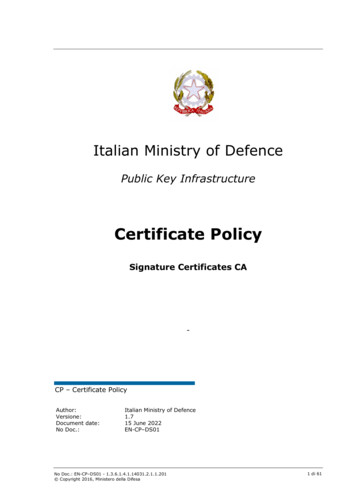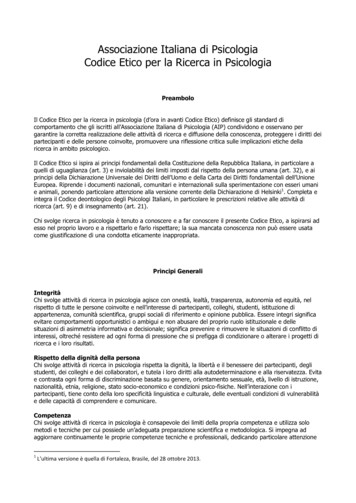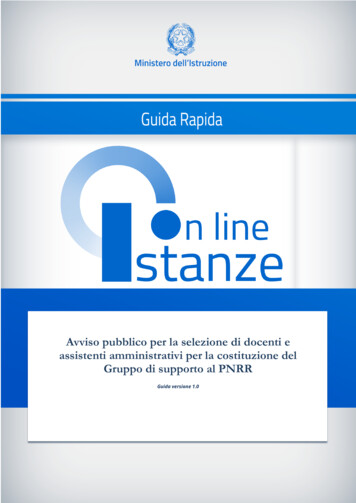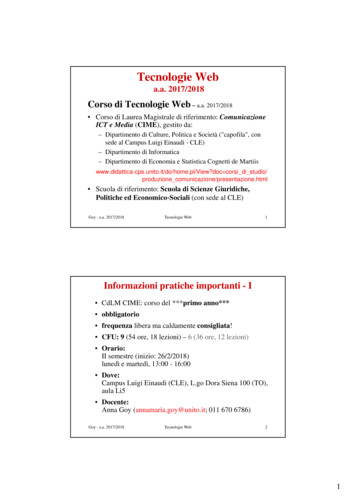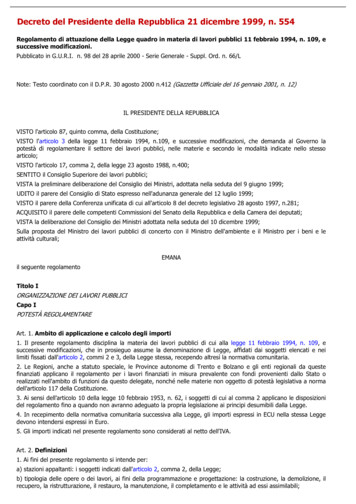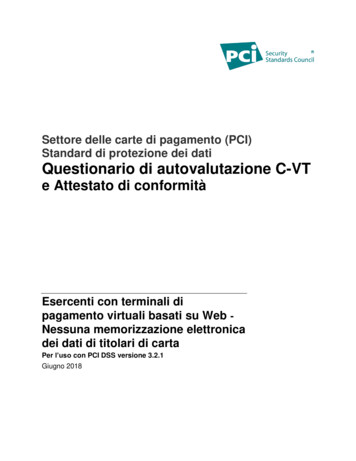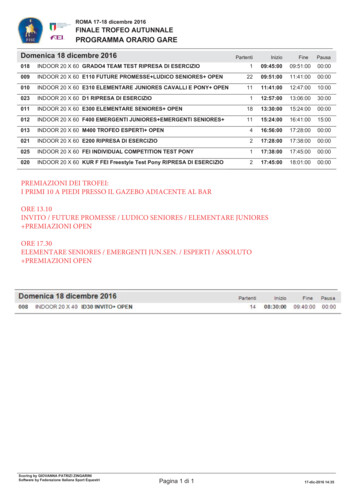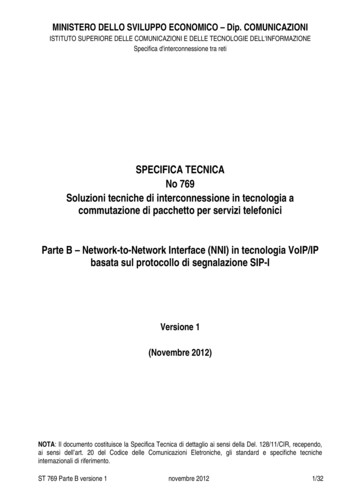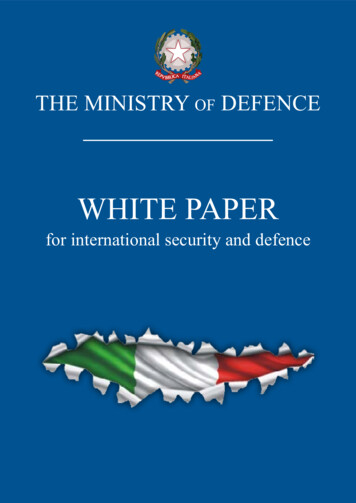
Transcription
MINISTERTHE MINISTRY OF DEFENCEWHITE PAPERfor international security and defence
MINISTERTHE MINISTRY of DEFENCEWHITE PAPERfor international security and defenceJuly 2015
DIFESA-2-
IndexFOREWORD7Chap. 1 WHY A WHITE PAPER?13Internal reform in the Ministry of Defence17The military, security and defence16Defence and the State19Chap. 2 STRATEGIC FRAMEWORK21Security of the Euro-Atlantic region26The evolution of the strategic scenario21Security of the Euro-Mediterranean region27Global security31Chap. 3 INTERNATIONAL SECURITY AND DEFENCE POLICY33A more secure nation37National interests and objectivesA more secure Euro-Atlantic region3338A more secure Euro-Mediterranean region38A more secure and stable global systemInternational security and defence strategy and the necessary capabilitiesTasks and missions of the armed forces393941Chap. 4 LESSONS LEARNED AND THE IMPLICATIONSFOR THE ARMED FORCES43Constants and changes in the characteristics of conflicts46Lessons learned from operations43Implications for the armed forces48-3-
Chap. 5 PREPARATION AND READINESS OF THE ARMED FORCES51Required levels of readiness and preparation53What does Defence have to be ready for?Military installations, live ranges and military propertyReserve Forces525557Chap. 6 THE TRANSFORMATION OF THE ARMED FORCES59General concepts and principles for the review of the force structure60Future operational model of the armed forces and development of capabilitiesThe review of governanceGeneral concepts and principles596364Political management66The Defence administrationProductivity of resources and expenditure controlEnlistment and personnel structuresGeneral concepts and principles68707172Chap. 7 ORGANIZATION, STRUCTURE AND CAPABILITIESOF THE ARMED FORCES75The review and management of command structures75The new organizational structure of the armed forces75The development of unitary capabilities and joint force integration78Defence training structureRegional organisation and organismsEnhancement of values peculiar to each military componentCapabilities to be generated for an integrated national forceMajor development programmes-4-7981818285
Chap.8 HUMAN RESOURCES87Recruitment and personnel structure88Personnel as a strategic resource87Education and training91Personnel structure and careers94Civilian Defence personnel96Health and safety at work97Financial remuneration98Reintegration into the civilian work environment and the value of professionalism100Chap.9 INDUSTRIAL POLICIES FOR SCIENCE AND INNOVATION105The security and defence industry107Citizens and the armed forcesGeneral scenarioTechnological competence102105107Science and technology110Global dimension of the defence sector111The relationship between Defence and industry112Defence, industry and university116Management of development and acquisition programmes115Chap. 10 STRATEGIC PLANNING AND IMPLEMENTATIONOF THE WHITE PAPER119AFTERWORD123-5-
DIFESA-6-
White Paper: Objectives, Criteria, Lines of ActionArmed Forces: from a joint vision to a joint realityIn entering the new millennium Italylagged behind on many fronts. Threemain areas of concern characterizedthe sector of international securityand defence: political and institutionalparticipation in the defence debate, thestructure and functioning of the administration and the relationship betweenItalian citizens and Defence. A countrythat pays no attention to Defence themes makes it difficult to intervene onits military to improve it. A politicalsystem that steers clear from these problems hampers the establishment of astrong relationship between the peopleand the Armed Forces, a relationshipable to strengthen their sense of belonging to the national community and their trust in the institutions. So far, theseweaknesses have prevented our country from timely and effectively tackling both themodernization of the Defence system and the many challenges we have been confronting for a long time. The requirement for a State more capable of protecting ournational interests stems from the changes we are witnessing in an ever more complexworld. The new millennium, in fact, is especially characterized by two historicalchanges: globalization and the digital revolution, which nurture an ever strongerinterconnection and interdependence between geographical areas, countries, economic sectors, markets and cultures. A farsighted, pragmatic international security anddefence policy is of fundamental importance to provide our country with a militaryable to safeguard our most important achievement, accomplished at the cost of great-7-
sacrifices: our freedom. It can, moreover, protect us from risks and possible threatsand allow us to tackle our responsibilities within the international community. In thelast few years the relevance of those responsibilities has increased in the face of aninternational scenario where crisis areas have widened, have become more complexand are approaching the European borders.New threats - terrorism in the first place, with attacks being now carried out also inour continent- cast their shadow over our freedoms. The Mediterranean area - whereour country is historically, politically and economically located- is again attractinginternational attention because of its many crises and conflicts, to which there seemsto be no easy or quick solution. The world has deeply changed and so have manyaspects of security that we had taken for granted. Within the framework of the international institutions that Italy regards as its points of reference -the UN, NATO, the EUthose challenges require a coordinated response from all our national capabilitiesas well as the availability of effective tools, not least a modern and capable defencesystem. We must all be aware that the Ministry of Defence and the Armed Forces areimportant parts of the country and of its public service, especially for the role theyplay as guarantors of our freedom and strongholds of our national independence.Upgrading our capabilities to meet current requirements, improving effectiveness inactions and operations and ensuring overall cost-efficiency are the priority goals tobe met by the Ministry of Defence and by the Armed Forces within the framework ofthe reform process of the State bodies, i.e. the objective identified by this Governmentsince its inception.In this perspective, the White Paper submitted by the Government to the other Institutions and to the national and international public opinion intends to set short-to-medium term objectives, criteria and actions, thus providing our country with an updateddefence capacity able to safeguard our interests in cooperation with all the other national instruments. Nevertheless, in Western democratic countries the growing levelof insecurity has gone side by side with a decrease in defence investments - due to thefinancial and economic crisis- and a reduced sensitivity toward defence themes compared with other economic and social issues. This trend, which requires a reflectionand an adjustment of our Armed Forces, has become evident also in Italy.The Armed Forces are a very valuable asset and a capable and effective reality that-8-
must be preserved over time and prepared in time. From the very beginning of mymandate, in order to safeguard this valuable asset, I saw the necessity of a WhitePaper for International Security and Defence that could serve as a guide to adapt theArmed Forces to the new requirements, and to foster greater awareness in our countryabout security and defence being common assets and indispensable conditions for thedevelopment of our society. This was also the reason why I decided that the drafting ofthe White Paper should be open to the contributions of all the parties interested in ourdefence system and to the public opinion.Many innovations have been introduced over the last fifteen years. As a consequence,the Armed Forces have changed by adopting a professional model that is more agile,fully gender-equal and increasingly integrated at the international level, evolving toward the joint organizational structure provided for in the Defence reform started byformer Defence Minister Andreatta.The Government intends to finalize the Defence reform process while removing unnecessary bureaucratic structures and unproductive duplications, and changing allorganizational or managerial solutions that do not appropriately justify their cost. Onthe other hand, it’s worth underscoring that in the last few years the Defence has already done a great deal in terms of expenditure cuts and rationalization. It suffices to notethat the Ministry has been the “first contributor” in reducing current expenditures, hasalready introduced various organizational simplifications and finally, based on Lawn 244/2012, has, of its own initiative, cut its personnel by about 25%, lowering thenumber of the military from 190,000 to 150,000 and that of civilian employees from30,000 to 20,000.The transformation process, however, is not over, since our future defence requiresthe Armed Forces to think and operate as a single instrument, where their individualtraditions, specificities and different capabilities become the strongpoint of their unity,rather than a weakness resulting in their separation. In brief, we must move from a“joint vision” to a fully joint “reality”. Thus, we will be able to employ and integratenew technologies and make our decisional processes, so effective and efficient in ourout-of -area operations, as effective and efficient across the whole spectrum of ouractivities and sectors of intervention, from procurement to infrastructures, doctrine,recruitment, logistics and training.-9-
This new, more effective military must be employed carefully, on the basis of our strategic priorities. Italy is a country with an exceptionally rich experience and greatabilities that have allowed it to work hard and well at international level. Moreover,our geopolitical position, at the centre of the Mediterranean basin, offers many opportunities, but also unavoidable obligations. Italy is able and willing to cover arecognized position of responsibility in its area of interest and, according to its means and resources and in harmony with the International Community, to contribute topeace-establishment and regional development.In this perspective, the Defence will put its multiple abilities at the service of the Country, in order to understand, prevent, tackle and solve crises, and to develop a network ofrelationships able to foster the stabilization process in the Mediterranean area.As an asset of the country, the Armed Forces are and will always be at the service ofthe community, when performing both their institutional and support tasks, tacklingall kinds of emergency situations.Together with the priority lines of action illustrated above, we must also provide newpolicies aimed at supporting innovation and scientific and technological research. Aneffective security and defence policy, in fact, must maintain appropriate technologicaland industrial capabilities, able to meet at least part of our requirements. To achievethis objective, close cooperation between the Defence and industry, as well as universities and research centres, will be the keystone of future action, hopefully also in viewof the European integration process.The establishment of a virtuous relationship between the conversion of military requirements into specific technologies and products and the final users will strengthen thecompetitiveness of the “national system” ensuring jobs, technological innovation andindustrial development that will benefit the whole community. Our future Armed Forceswill therefore have to be young, well trained, motivated and appropriately remunerated.Our military, our defence professionals, will ensure the country the best possible defence framework, implementing their tasks by using modern tools within a functional andessential operational structure, working effectively, with a spirit of sacrifice.As citizens who, to comply with the oath they took when they joined the Armed Forces,cope with a difficult life, sacrificing their affections and their rights, our men andwomen in uniform, as well as their families, will never lack respect, support and a fair- 10 -
social treatment.This perspective and this spirit are the basis of the White Paper’s strategic analysisand design synthesis.The strategic guidelines illustrated in this foreword are therefore the political guidance needed to develop implementation solutions. In particular, since strategies areworth nothing without the tools needed to implement them, this White Paper is to befollowed by concrete legislative and regulatory proposals and a Defence strategicreview which will outline how the future Armed Forces will be shaped and equippedto effectively tackle possible risks and current and medium-term threats.Finally, let me thank all the military and civilian experts who have worked with mefor more than a year: their commitment has been crucial to drafting and publishingthis White Paper.I hope that this paper will now foster renewed attention toward the Defence, and thenecessary support for the ambitious review project outlined in it.Minister of DefenceSen. Roberta Pinotti- 11 -
DIFESA- 12 -
1CapitoloWhy a white paper?1. Today we are all living in aglobal environment that has become extraordinarily complex,difficult to understand and uncertain in its development. The80’s of the last century endedwith the conclusion of the historic period known as “bipolarconfrontation” and with a newhope in the beginning of a global process toward peaceful coexistence, in which theinternational crises would have been resolved through the masterly use of diplomacy,economy and international organizations.2. However, the following twenty years demonstrated that this was an optimistic forecast. In a very short space of time, stable areas of the world became the scene of horrendous atrocities and crimes against humanity, we believed had been buried forever.At the same time, crisis situations existing before the “Cold War” were rekindled andintensified, generating effects in neighbouring areas. The start of the process of globalization has brought wealth and development in many areas, but it has also createdstrong social disparities, transfers of wealth and productive tools. Aspirations towardsdemocratic and participatory social models haves shaped a new generation of people,who have thus become aware of their traditions, rights and values, but it has startedat the same time the resurgence of nationalism and conflicts based on intolerance, religion and competition for primary resources. The revolution started with IT and newtechnologies seemed to offer mankind the chance to obtain more from the planet, butit also has had to face a growing awareness of the difficulties involved in sustaining- 13 -
such models requiring the intensive exploitation of resources, the control of whichprovokes new situations of crisis and conflict.3. It is not possible to predict what effects will result from these premises in the future,but a tendency towards widespread instability certainly looks set to remain at least inthe near future. The dynamics of this instability, on the contrary, seem to be more andmore violent and less confined to the places where they were generated. Phenomenasuch as the Caliphate and the destabilization of important neighbouring regions forsocial, economic, health or religious reasons, as well as the more traditional politicsof power, require us to look at these events with concern. Concern that arises fromthe knowledge that we must ensure in the long term, with our allies, a condition ofsufficient deterrence, functional in preventing future conflicts in the Euro-Atlanticand Euro-Mediterranean regions. We must take the responsibility for forecasting,preventing and, if necessary, managing events generated by situations of instabilityin terms of threats and attacks on ournational integrity, our sovereignty andour vital interests, without excludingthe risks generated by mass migration,pandemics, terrorism and crime.4. In this perspective, the “defencefunction” and its operational component represented by the military, isan essential element of the nationalsystem which protects and guaranteesour freedom. Freedom obtained fromthe sacrifice of past generations, which is an essential and necessary condition to safeguard free institutions and citizens’ rights.5. Therefore faced with a situation of increasing international instability and insecurity, there is now a great need for Italy to deal rationally and methodically with theproblem of national security and defence, as well as with foresight, not just by mana-- 14 -
ging sudden events appropriately, but by developing a broader comprehensive strategyinvolving all the capabilities of our society. The defence of the State, in fact, cannotand should not be limited exclusively to the indispensable action of the Armed Forces.It must be a unicum in which every segment of society, according to aptitude andability, contributes to the creation of the broad and coordinated security frameworkthat is a real guarantee of freedom for our nation.6. This challenge requires the Government and Parliament to examine major nationalsecurity and defence issues, in order to define a structured National Security Strategythat is able to cope with and manage the security problems Italy will have to face inthe future, in a coordinated and synergistic way.7. In addition, the intense activity carried out by the Defence in theatres of intervention means that renewed attention needs to be given to the “command of the armedforces”, in particular during military operations and especially in the light of the manytasks undertaken in support of the international stability in recent decades. Leavingaside the functions of the constitutional authorities, it seems useful to reflect on theadequacy of the governing bodies and their related support structures, developed overthe years to deal with situations of crisis or emergency. Their functioning, in fact,is strongly influenced by both the limited scope given to them at the time of theirfoundation, and the absence of specific primary legislation outlining their powers andconfiguration. It is, therefore, appropriate to study new solutions in order to ensurethe rightful position of the delicate decision-making process relating to the exerciseof military force, in compliance with the mandatory constitutional principles and theinescapable demands of timeliness and effectiveness.8. The strategic analysis and design of this White Paper within this context and fromthis perspective has the threefold purpose of:- indicating, in the medium-term, which military component can best address thechallenges and opportunities that are relevant to the Ministry of Defence in terms ofinternational security and defence;- identifying which model of governance and consequent organization can best gua-- 15 -
rantee the Ministry its compliance with modern criteria of effectiveness, efficiencyand economy, to allow the Defence to successfully face the challenges of today andtomorrow;- developing cultural and organizational elements that enable the Defence to contribute systematically to the Nation’s effort to develop the necessary framework of securitypreviously referred to.9. The elements contained in this White Paper are the basis for the development ofsolutions to be implemented and which will have to be refined and developed quickly,according to the indications outlined in the final chapter.The military, security and defence10. The Italians of our generation have experienced a long period in which it waspossible to take advantage of a wide security framework and during which the participation in international efforts for peace and stability was a question of “choice”.Under In the current situation it is important not to underestimate the fact that directinvolvement in some of the current or potential crises could become an unavoidablecommitment. It is therefore necessary to prevent the occurrence of such situations andtake appropriate action in the event of failure, in order to contain them - before theybecome too big to be faced with only limited sacrifice.11. The financial and economic crisis and the need to contain the public debt, however,do not allow the country to provide in the short term, all the resources that wouldbe needed to address these challenges with all the right tools and in all situations.Through a wise choice and use of the tools that are available, we need to identify thecorrect priorities for action and the most appropriate ways of intervening to ensure theachievement of the strategic objectives that are being pursued.12. Secondly, it is necessary to summarize two requirements: the preparations necessary to deal with an immediate crisis involving the nation and the preservation,- 16 -
in a broader perspective and in the longterm, of the ability to deal with situationsof traditional conflict. The latter case, isperceived as less likely today, but cannotbe neglected because it can affect vitalnational interests, including the very survival of the State, more than any othercircumstance.13. Finally, we need to understand in what way and to what extent the different international organizations of which Italy is a member, contribute to international securityand the defence of the nation. Membership of the Atlantic Alliance is vital for the organisation’s strategic function and is also useful in reducing the overall impact of thedefence function on the national budget. From this viewpoint it is necessary to assessthe way in which this participation deals with the fair division of responsibilities, inproportion to the overall potentiality of the country. Participation in the process of European integration in the field of defence, on the other hand, means that it is necessaryto think about the question of what legal and political instruments must be developedin order to produce more security. The need to contribute to the peace initiatives of theUnited Nations, makes it necessary to provide all those activities which can render therole of the nation credible within the organisation.Internal reform in the Ministry of Defence14. The ministry of Defence is facing an historic moment characterized by complexand pressing needs, which require fast, effective action in order to preserve, and inthe longer term to strengthen, the fundamental function that it expresses. At the sametime, the government is aiming at a broad reform of the public administration, in orderto provide the State with modern tools for the development of the activities. In order torespect the specific features associated with the functions to be performed, it is therefore in the interest of the country that the Defence is included in this period of reform.- 17 -
15. Furthermore, it should be noted how the military has undergone various changes inthe last twenty years in order to respond to multiple contingent needs. The recent lawNo. 244, 2015, however, has significantly decreased the numbers of the armed forcesto about 25 % of the original size, and introduced new organisational changes. It is therefore evident that a more systematic and comprehensive review of the governance ofthe Defence is needed, which, in the spirit and full implementation of 1997 Andreattareform, can lead to a truly integrated structure distinguished by greater efficiency andeffectiveness and especially by economy of operation.16. Personnel is one of the most important issues for Defence. Over the last two decades important reforms have been carried out, such as the suspension of compulsory military service and the introduction of a “professional model”, as well as theintroduction of military service for women. Today, on the basis of this experienceand partial legislative adaptations, it has become clear that systematic revision is necessary in order to renew, balance and simplify, both the legislation which regulatesthe enlistment process and career progression, as well as the measures that define thegeneral legal framework of reference for staff.17. Finally, the need for a more coordinated and transparent leadership requires somechanges in decision-making and internal operations, to ensure a more effective political management of the ministry and better interconnection with other ministries,as part of a united action by the government and conducted by the presidency of thecouncil of ministers. With regards to cooperation between the institutions, it also appears necessary to investigate how to improve communication with regional and localauthorities. Using Defence not only for military action and intervention, but also inthe case of major catastrophes, for example, means that it is necessary to think aboutthe need for integration and coordination with local authorities and public functionslocated in the autonomous system that will be developed.- 18 -
Defence and the State18. The function performed by the Defence is part of the constitution and it is fundamental to the State for its preservation and creates the security framework that is indispensable for the development of the nation. During periods of crisis and transition,like the one we are experiencing, it is nevertheless necessary to further strengthen thevital links that should always exist between the ministry of Defence and the otherministries, between the armed forces and other State capabilities and between the military and the rest of the citizens, to achieve that interdependency between the differentparts of the same organism which is essential to the life of our community.19. It is essential for our nation to better understand the duties, functions and featuresof the Defence and of the “citizens in uniform” who serve their country, in orderto ensure full knowledge of the facts, the requirements, advantages and the possiblecorrelated risks. On this basis the citizens and their elected representatives will be ableto make rational and well-informed decisions and fully accept responsibility in thecritical sector of Defence. Communication between the government and parliament isessential to this process and new ways of providing information and communicatingwill need to be developed in accordance with their constitutional powers.20. Addressing the problem of national security and defence from a modern perspective requires a comprehensive and multi-disciplinary approach. It is necessary to thinkabout how the various capabilities which make the country safer can be developedand if the concept of “defence” can evolve, become broader, including all the differentperspectives and skills involved in it. This concept, moreover, integrates well with theinnovations launched by the government for the reforming the so-called “third sector”,in particular with regards to the role and functions of National Civil Service. In thiseffort, the underlying connecting element of the evolution is represented by the sharedvalues which permeate the very existence of our nation.21. A real sharing of the same framework of values between citizens and their armedforces requires constant communication and assiduous interaction between the parties,- 19 -
who make transparency, public interest and constructive criticism the basis of the trusting relationship which should always exist between institutions and citizens.22. With the intention of contributing to the effort made by the entire national community, this paper intends to give a precise and decisive impetus to the transformation ofthe military in terms of greater efficiency, effectiveness and economy of management.This is both the starting point for a complex reform and adaptation of our armed forces, and the basis for initiating a broad and mature reflection on the issues of international security and defence. The historical period in which we are living demands allthat. Also the citizens who daily observe serious international events are requesting it.As a government it is our duty as a government to make every effort to address theseproblems with determination and give the best possible answers in the interest of thenation.- 20 -
2CapitoloStrategic FrameworkThe evolution of the strategicscenario23. International relations are highlycomplex due to the interconnection ofa number of factors and actors. Thismeans that the system as a whole is both dynamic and strong, but it is also vulnerablebecause disruption and crisis spread easily and quickly. Italy is deeply rooted in theinternational system from every point of view with advantages and benefits gainedfrom this strong interconnection. Italy also provides a lot of support, in fact nationcould be considered as a substantial actor in terms of technology and commerce aswell as in terms of knowledge and culture.24. Moreover, Italy has developed awareness due to the increasing interaction andinterdependence with the rest of the world, considering also its geographical positionand the dependence on foreign countries for the supply of resources. As a consequence, the effects on Italy are almost social, cultural, and economic or it may give the riseto political phenomena altering the existing global and regional balance.25. Italy’s general policy and particularly its defence policy , cannot therefore be separated from a broad and diverse vision of ongoing problems and global dynamics, withmultiple dimensions. The option represented by a defence policy focused entirelyon some specific geographic areas or on some defined risk factors does not appearconsistent with the strategic needs of a nation so deeply integrated in global dynamics.On the other hand, given the actual size of the nation and its overall interests, strict- 21 -
realism in setting priorities and in choosing intervention tools is required. Choicesr
The military, security and defence 16 Internal reform in the Ministry of Defence 17 Defence and the State 19 Chap. 2 STRATEGIC FRAMEWORK 21 The evolution of the strategic scenario 21 Security of the Euro-Atlantic region 26 Security of the Euro-Mediterranean region 27 Global security 31 Chap. 3 INTERNATIONAL SECURITY AND DEFENCE POLICY 33
